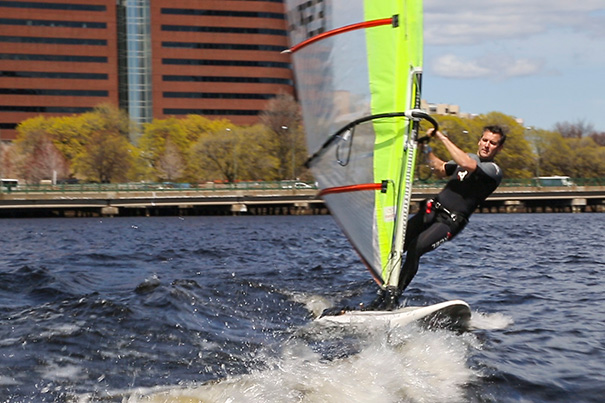
Photo by Joe Sherman/Harvard Staff
Race ready
Gonzalo Giribet brings scientific rigor to windsurfing
Windsurfer Gonzalo Giribet follows pianist Vijay Iyer and surgeon Terry Buchmiller in the Practice series.
The stacks of papers are graded, the final exams administered. Now is when many faculty members jet off to enjoy summer vacation, conduct fieldwork, or bear down on book projects. But for Gonzalo Giribet, the warmer months offer a brief chance to shake off the winter rust and hit the water to practice a sport he’s loved since he was a boy.
Every summer, Giribet, the Alexander Agassiz Professor of Zoology in the Faculty of Arts and Sciences, packs up his race boards and sails and heads out to compete in some of the top windsurfing regattas in the world, such as the Spanish National Championship, the European Championship, and the World Championship. He frequently finishes in the top 20 in his age division, a field often stocked with ex-Olympians and retired professionals.
Windsurfing is a sport that demands rigorous, consistent dedication to perform at a high level, which Boston’s climate and chilly waters certainly don’t make easy.
“I know that to place in the top 10, I have to windsurf every day,” Giribet said. “And I can’t windsurf everyday, so I’m looking for the 10th to 20th or 10th to 25th [place] with my skill and my many years of doing it.”
During the long, cold off-season, Giribet runs just to stay fit. The real work comes when he gets his board in the water — not till late April, this year, thanks to the extraordinary winter.
“In the beginning of the season, it’s just to put hours in your hands and your arms to try to develop your calluses, to try to develop the specific muscles,” he said of the necessary strength and core work.
“For me, a lot of the training at the very beginning is to get back into the physical condition, to be able to race three or four races a day for seven days, which is pretty hard. Every muscle is sore; upper body is the big part, especially when I finish these regattas, my arms look like double the size, they’re just so stiff. Your back is always like — you’re super-tired, and everything hurts.”
While windsurfing’s physical demands are substantial, its technical and mental aspects are equally important. Giribet says he’s known for his precision and attention to detail when preparing his equipment, and he counts his personal sailmaker as a close friend.
“That’s probably the scientific part of me,” said Giribet, who teaches organismic and evolutionary biology. “My gear is always in perfect condition, it’s always well-trimmed. For me, it’s very mental, because that’s when you start concentrating. You’re preparing things, you’re making sure the sail is properly rigged, that everything works, you’re putting [on] your silicone spray; if you have any damage, you’re fixing the damage. So all that preparation, you’re already racing.”
Growing up in a small beach town just outside Barcelona, Giribet always had a strong affinity for the sea. “A lot of my work is marine biology. I grew up at the beach collecting shells, collecting animals, swimming, then windsurfing [and] diving, so I’ve always been very connected to the ocean,” he said. “I was like 12, 13 years old. The summer prize for getting good grades, I got a windsurfing course.”
When Giribet feels in good condition and his equipment is tight, he gains a confidence boost and a mental edge that can lead to bolder tactics on the water. Optimizing performance and strategic advantage is essential in competitions where seconds can separate winners from losers. In championship races, as many as 100 windsurfers race around courses trying to clock the fastest time. Winners are those with the fewest points over several days of racing.
Another advantage comes from a strong sense of the interplay between the elements — how the wind changes with the sun, how the currents run — and physical skill.
“The one very big thing in windsurfing is that two people could be world champion depending on the conditions. If there’s no wind, this person could win. If there’s strong wind, this other person wins. It’s very different from running,” Giribet said.
“There’s no other sport like sailing, in the sense that every time there’s a big competition in a place, the locals have so much more advantage.”
For Giribet, windsurfing’s appeal is multifaceted.
“First, it’s the freedom of being in the water, going with the wind. It’s a sport that you can do it for hours when you’re in good shape. And then the competition … has always been something big for me and that’s what I really missed” when he stopped competing for a few years after moving to the United States.
“When I windsurf and I compete … that’s when I completely disconnect. When I’m racing, I wake up, I prepare my board, spend the whole day racing, then I need to do stretching and then I need to prepare the board for the next day and then go to bed to be up early to be competitive,” he said. “It’s my time off, complete isolation from my work … and then I come back much more energized.”




